Short Answer Questions: Private, Public and Global Enterprises | Business Studies (BST) Class 11 - Commerce PDF Download
Q1: What are the major objectives of public enterprises?
Ans: Public enterprises are guided by several socio-economic and political objectives.
Importance/Need/Objectives of Public Enterprises: Public enterprises have got the following motives:
- Economic Motive/Objectives:
(a) Availability of essential commodities of life in sufficient quantity at cheaper rates: These industries aim at supplying essential commodities at cheaper rates to the people. Mother Daily and Delhi Milk Scheme in Delhi are its examples. Water, electricity, and gas supply are also in this category.
(b) Establishment of basic industries: In order to accelerate the pace of economic growth, basic industries are a must. These industries require heavy expenditure and Carry a lot of risks. This is why private entrepreneurs hesitate in establishing basic industries. These industries are iron and steel, locomotives, aircraft, and ship-building, etc.
(c) Balanced regional development: Private industries are not keen to set up industries in remote and backward regions due to a lack of facilities and infrastructure. It leads to the haphazard and unbalanced development of the country. Public enterprises aim at balanced regional development of the country in addition to their economic motive. - Social Motive: Involvement of the government in these enterprises is because of the social welfare of the people. Satisfying the basic needs of the people at cheaper rates shows the social motive of these enterprises. They help to check malpractices on the part of private entrepreneurs.
- Political Motive: Ministers, Members of Parliament and Legislative Assemblies try to establish a public enterprise in their constituencies for political gain This results in the growth of the area, and the states of the politician, and thus political motive is achieved and regional imbalance takes place.
- Reduced wasteful expenditures: Wasteful expenditures can be reduced with the nationalization of industries, because under private ownership company may not be managed efficiently, so expenditures of 11 that company may be excessive. Therefore, there is a need b nationalization.
- Self-Reliance: These enterprises save valuable foreign exchange through import substitution In addition, public sector enterprises export goods on a large scale to attain the goal of economic self-reliance.
- Infrastructure: Transport, communication, irrigation, power, etc. can be developed only on large scale, with huge resources but a private owner cannot have huge resources. So there should be a nationalization of infrastructure.
Q2: Differentiate between Private and Public Sector Enterprises.
Ans: Difference between Private and Public Sector Enterprises:

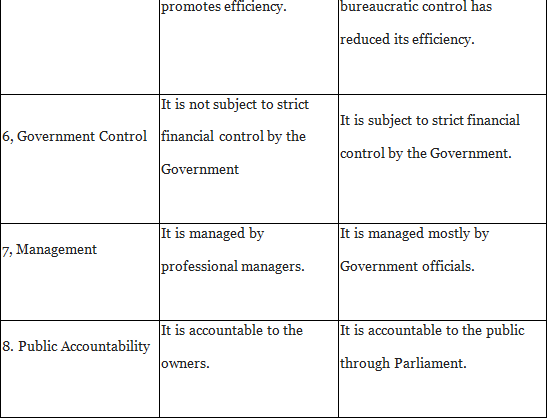
Q3: Mention, in brief, the significant features/characteristics of Global Corporations.
Ans: Features of Global Corporation: The important features of most multinational corporations are as under:
- Giant-Size: The assets and sales of MNCs run into billions of dollars and they make huge profits through their operations. For example, the physical assets of IBM are worth around 8 billion dollars. The sales turnover of some global corporations exceeds the gross national product of several developing countries.
- International Operations: An MNC operates in many countries through a parent corporation in the home country. It runs its operations through a network of branches, subsidiaries, and affiliates in host countries. Production, marketing, and other operations are scattered in different countries to get the economies of local operations.
- Centralized Control: An MNC has its headquarters in the home country in order to control the branches and subsidiaries. The local management of branches and subsidiaries operate within the policy framework of the parent corporation. This is possible due to the fact the parent-company holds40% to 100% of the equity of the subsidiary company.
- Oligopolistic Power: Many multinational corporations enjoy oligopolistic power. They occupy a dominant position in the market. Through the process of merger and takeover of other firms, an MNC may acquire a huge economic power. This makes it oligopolistic in character because of which it has a dominant position in the market. For example, Hindustan Lever Limited acquired Tata Oil Mills to improve its market shares.
- Collective Transfer of Resources: A multinational corporation facilitates a multilateral transfer of resources. Such transfer takes place in the form of a” package” which includes technical know-how, machinery, and equipment, raw materials, management expertise, etc.
- Professional Management: These corporations employ professional skills, specialized knowledge, and training. These managers have specialized training and skills in different functional areas like finance, marketing, and human resources.
- International Market: MNCs have access to international markets as a result of vast resources and superior marketing skills. Because of this, MNCs are in a position to sell whatever products they manufacture in different countries throughout the world.
Q4: Explain the term Foreign Collaboration in brief.
Ans: Foreign Collaboration: Enterprises having equity participation V of foreign units is known as foreign collaboration. It is an enterprise jointly owned, managed, and controlled by Indians and foreigners. These enterprises are enjoying the vast resources of the country and abroad. It combines the financial resources and managerial and technological expertise of two or more countries.
The amount of profit is shared ( between the Indian owner and the foreign partner. The government these days has liberalized its policies regarding foreign participation in Indian i: enterprises. According to New Industrial Policy, 1999 approval will be given for direct foreign investment up to 51% equity in high priority industries and automatic permission will be given to foreign technology agreements in identified high priority industries.
Q5: What do you mean by the term “Disinvestment of Shares”?
Ans: Disinvestment of Shares-The major plank of the privatization program in India has been the disinvestment of government shareholdings in a select number of public enterprises. The rationale behind this program is to raise a non-inflationary form of finance for the budget.
The program commenced in 1991-92 and till 1995-96 the „ government had disinvested a part of its equity in 40 public sector enterprises and had raised an amount of Rs. 10,915 crore through the various rounds of disinvestment undertaken between this period. The shares were offered to financial institutions, mutual funds, private sector enterprises, and the general public as well.
The Union Government constituted Disinvestment Commission in August 1996 to advise it on the disinvestment program of public sector enterprises. The government referred 40 public sector undertakings to the Commission for advice about disinvestment. The government has now been taking steps to implement the report of the Disinvestment Commission.
To ensure transparency in the Disinvestment program, bids are invited for the sale of shares of selected public enterprises and the shares are sold to the highest bidder. During 2000-01, the Government raised Rs. 1,869 crores through disinvestment in public undertakings as compared to Rs. 1,829 crores during 1999-2000 and Rs. 5,371 crores during 1998-99. The target of disinvestment for the year 2002-03 was Rs. 0 crores.
Q6: What is Departmental Undertaking? Mention its advantages and disadvantages.
Ans: Departmental Undertaking – It works as the ministry or a department of the government. The budget of these departmental organizations is presented to the parliament just like other ministries. Indian Railways and Post and Telegraph departments are its examples.
Departmental organizations are entirely owned and controlled by either the Central Government or by a State Government.
Advantages of Departmental Undertaking: Departmental organization enjoy the following merits:
- Service Motive: These enterprises are formed with a service motive. Public interest and social welfare hold priority for them. These undertakings also help to reduce the burden of tax on the public.
- National Importance: Activities that have got national importance are performed by these departmental organizations. The risk of misuse of public money minimized due to strict budget, accounting, and audit.
- Secrecy: These organizations are capable of maintaining secrecy. because these are under the control of the government. The government can avoid disclosure of facts on the plea of public interest.
- Proper Management: These enterprises are managed by qualified government staff. Their work is systematic. They are properly v managed and supervised. Such control and management keep the government official alert.
Disadvantages of Departmental Undertaking – Departmental organization suffer from the following disadvantages:
- Least profit earning venture: Departmental organization is owned and controlled by the government. It is formed with a service motive, so it does not remain an excellent profit earning venture.
- Red tape: Employees follow the beaten track. They do not take much interest in the work. They are careless and bother much for their salaries. Officers worry much for their status and respect. Decisions are generally delayed due to bureaucratic procedures and political considerations.
- Lack of competent workers: Government employees are not much efficient in business affairs. They have sufficient administrative experience but not experienced enough to manage the activities of, the enterprise. Promotion to the higher rank is based upon seniority, so competent employees are not recruited.
- Political evils: Every important decision in the departmental organization has a political motive. It is managed and controlled by the minister, who is the representative of a political party. The minister has to look after the interest of his party.
- Lack of competition: Generally departmental organizations have the status of monopoly. Lack of competition makes them incompetent. In the absence of competition and profit motive, there is little incentive for hard work and efficiency. There is hardly any link between reward and performance.,
Q7: What are statutory/public corporations? Present their advantages and disadvantages.
Ans: Statutory/Public Corporations: Public corporations are; formed by the special act of Parliament or Legislative Assemblies. Their existence is separate from the government. This is why these corporations are called autonomous bodies. Though these corporations are independent in financial matters, even then they remain under the control of the government. It is an autonomous body fully financed by the government.
According to Morrison, “Public corporation is a combination of public ownership, public accountability, and business management for the public end.” Examples of such corporations are Air India, Life Insurance Corporation of India, etc.
Merits/Advantages of Statutory Corporations – Public corporations enjoy the following merits:
- Free from government control: These are autonomous bodies, which are not under the direct control of the government.
- Service motive: These corporations are also formed in the public interest for social welfare like other public enterprises. Service motive dominates their activities.
- Independent decision: Public corporations are independent in making their own decisions, policies, and plans.
- Efficient management: These corporations are benefited from efficient management because they are managed by a competent board of directors, who are professional in their attitude and work. As changes in government do not affect its stability, it can take long term policy decisions.
- Economic self-independence: Public corporations are financially independent. They have to arrange their own finances. It is free from political interference by ministers and bureaucrats.
Demerits/Disadvantages of Statutory Corporations – Public corporations have got the following disadvantages:
- Red Tape: Like other public enterprises and government departments public corporations are also victims of red-tapism.
- Rigid structure: The constitution of such a corporation is rigid. The objects and powers of such corporations cannot be changed without amending the statute, which is a time-consuming and cumbersome process.
- Theoretical autonomy: The autonomy of these corporations exist only on paper. In actual practice, interference by political bosses and ministers gives the wrong signal to their autonomy. Red-tapism and bureaucratic control reduce the flexibility of operations.
Q8: What is a Government Company? Define its merits and demerits.
Ans: Government Company – A Government company is a company in Which not less than 51 percent of paid-up capital is held by the Central Government or State Government jointly by both Governments. It is formed and registered under the Companies Act 1956.
Merits of a Government Company: A government company enjoys the following benefits:
- Internal autonomy: A government company is a separate entity and so can manage its affairs on its own. There is the absence of direction. parliamentary and ministerial control. Thus, it is an autonomous body. It can be operated on commercial principles. It can manage its affairs independently.
- Flexibility in operations: It can be operated on commercial principles because of independence in respect of internal management, finance, and appointment of person.
- Collaboration: It is the only form of organization by which the Government can make use of managerial skill, technical know-how, and expertise of the private sector.
- Easy formation: It is relatively easy to form a government company as no statute is required to be enacted. It can be created by the executive decision of the Government.
- Expert management: Since the annual report on the working of the enterprise is placed before the Parliament or the State Legislature, the management of a government company tends to be cautious, and efficient to avoid its criticism.
- Sound management policies: It cannot afford to follow unsound policies because its working can be compared with similar companies in the private sector.
Demerits of a Government Company-The government companies usually suffer from the following weaknesses:
- Board composed with yes men: The Board of Directors of a government company usually consists of politicians and civil servants which may not be able to follow sound business principles.
- Theoretical autonomy: The independent character of a government company exists in paper only. Government officials, ministers, and politicians often interfere with its work.
- Lacking responsibilities: A government company evades the constitutional responsibilities which other state enterprises owe to the Parliament. The Parliament is not, taken into confidence for its creation as government decision is sufficient in this regard. The accounts of a government company need not be audited by the Comptroller and Auditor General of India. Thus, it concentrates more power in the hands of the Government than a statutory corporation.
The practice of forming government companies has been regarded as a fraud on the Companies Act because the Government is empowered to specify the provisions of the Company Act to be followed or applied and modifications if any.
Q9: Present a comparative view of different forms of public enterprises.
Ans: A comparative view of different forms of Public Enterprises: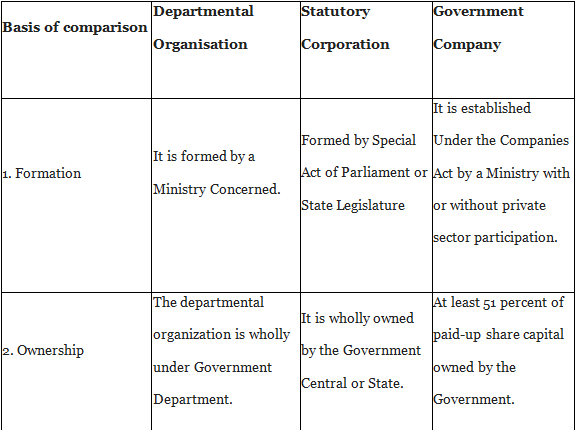
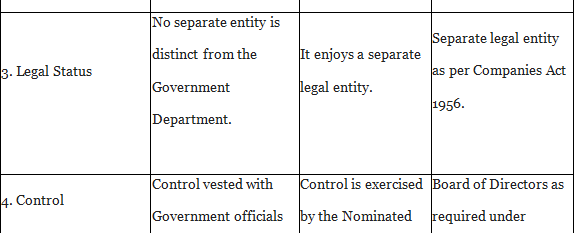
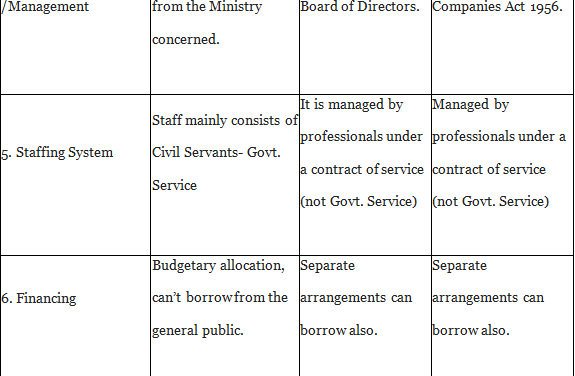
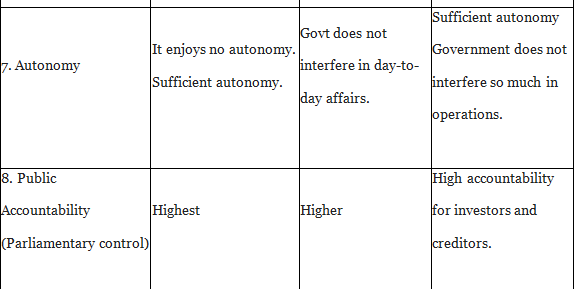
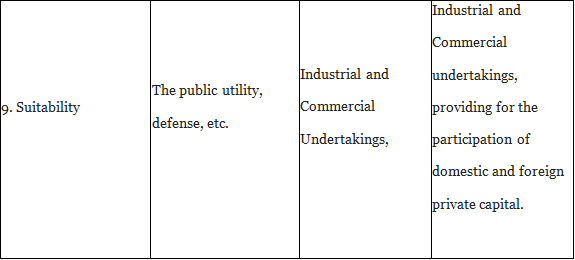
Q10: The role of the public sector is not satisfactory. What are the suggestions for improvement in public sector operations?
Ans: Suggestions for the improvement of Public enterprises- In order to make public sector enterprises more efficient and prone to public welfare the government set up various committees from time to time. Some important committees set up by the government are as under: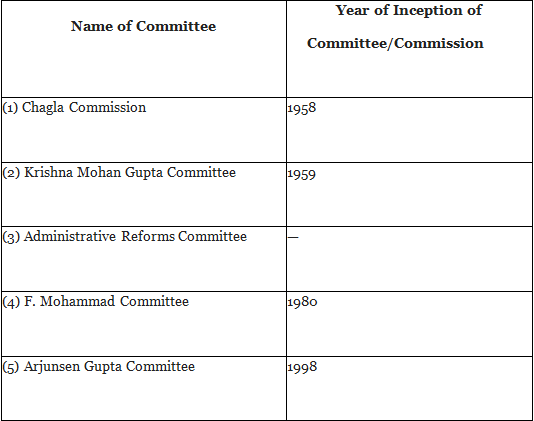
The annual evaluation is made by the Standing Conference of Public Enterprises (SCOPE) of al 1 committees made by the government. Some of the main and important suggestions offered by the various committees are as follows:
- Labour policy: Public enterprises should design their labor policy in such a fashion that there should be a cordial relationship between the workers and the management. Actions should be initiated in such a fashion to minimize industrial disputes.
Appointments should be based not on pulls and pressures but on ability and expertise. Efficient workers must be suitably rewarded. The compensation of employees should be linked with their productivity. Workers must have a sense of belonging to their organization. There should be only one trade union in an industry whose role is to maintain industrial peace. - Price policy: The government has realized that the price policy of public enterprises should be based on the existing price structure because there is no clear-cut perception about the price policy of public sector enterprises. Prices of commodities must commensurate to the public. The seventh plan emphasized that public enterprises must generate at least a 10% profit margin. So, the price should be determined with a view to raising the level of profitability in the government monopolies and promote public welfare.
- Commercial outlook: In any case; public sector enterprises must generate the surplus which may be plowed both in the form of investment for economic development. This is possible only when the cost is reduced and productivity is raised. It will benefit the consumer and the entire society. So, the public enterprises must adopt a commercial outlook by which there would Beacon-ordination between national and profitability.
- Autonomy to public enterprises: Public sector enterprises should have complete autonomy and minimum possible government interference in operation and routine matters. Politicians should not be appointed to control public sector enterprises. However, incompetent and able politicians are available, they should better be appointed as honorary consultants. In no case, should they be directly involved in the control and management of the enterprises?
Only professionals should be appointed as managers. They have been given greater autonomy so as to make them more efficient and competitive. - Inspection of public enterprises: Public Sector Enterprises Bureau has been established for the annual inspection of public enterprises for preparing their annual progress reports offering guidelines to public enterprises. Public enterprises are also inspected by Public Accounts Committee and Estimates Committee. Every public enterprise should publish a comprehensive report of its functioning, so that people may come to know of their performance. The government lays down performance targets for the management of public sector enterprises.
Dr. Lanka Sundram suggested that “Parliamentary committees be appointed for inspection of public enterprises.” Accepting this suggestion the government set up the Parliamentary Committee of Public Undertaking in 1963 which controls the public sector enterprises. - Proper auditing: According to the Administrative Reforms Committee, there should be three or four audit boards established under the direct control of the Comptroller and Auditor General so that accounts of public enterprises should be properly audited. Any lapse in this regard must be brought to the notice of the government by an independent auditor.
- Full utilization of productive capacity: The public sector enterprises should fully utilize their productive capacity; the Productive capacity of the existing enterprises should be raised only if at least 85% of the existing capacity is being utilized. Thus new industries and enterprises should be established only after complete utilization of the existing productive capacity.
Q11: Define Multinational Corporations and their role in the economic development of a nation.
Ans: Definition of Multinational Corporation (MNC): A Multinational Corporation refers to an organization that has its headquarters in one country and business operations in other countries. This means that this type of organization will have business across many countries. An MNC has its registered office in one country (called home country) and it carries its business operations in a number of foreign countries (called host countries).
A multinational corporation controls production and marketing facilities in more than one country. For instance, Coca-Cola is a company registered in the U.S.A., has production and marketing operations in many countries of the world.
Role of MNCs – Multinational companies have been playing an important role in several developing economies including India.
Multinationals can offer the following gains to the host country:
- Investment of Foreign Capital: MNCs can help the developing economies to secure capital from the developed countries as they suffer from a shortage of capital required for rapid industrialization. They facilitate the transfer of capital from countries where it is abundant to countries where it is scarce. Thus, MNCs can help increase the investment level and thereby the pace of development of the host country. Since liberalization, India has attracted foreign investment worth several billion dollars.
- Advanced Technology: The developing countries have old and obsolete technology. MNCs can be used as vehicles for the transfer of superior technology to developing countries. Advanced technological know-how, improved skills, and consultancy help the developing countries to improve the quality of products and reduce costs.
- Creation of Job Opportunities: The MNCs set up facilities for the production and distribution of goods and thereby create employment opportunities it is In the host country. M u Itinational offer excess lent pay scales and career advancement opportunities to managers, technical and other staff.
- Utilization of ldle Resources: The MNCs help in the utilization of idle resources of the host country and thus generate income for the country.
- Creation of Healthy Competition-MNCs increase competition and break domestic monopolies. The inefficient firms are forced to either improve or withdraw from the market. Many Indian companies now compete with multinationals after liberalization through improved technology.
- Professional Management: The MNCs kindle a managerial revolution in the host countries by professional management and the employment of the latest management techniques. The host countries are thus able to develop a culture of professional management. Multinationals build up a knowledge base through management techniques like MBO and corporate planning.
- Growth of Domestic Firms: The MNCs can help the growth of domestic firms to supply them materials, components, etc. Over the years, several ancillary units have grown to provide support to the MNCs.
- Higher Standard of Living: Because of their superior technology, MNCs provide a large variety of quality products to the people in the host country. This helps to increase their standard of living.
- Integration with the World Economy: The MNCs facilitate the integration of the economy of the host country with the world market. They encourage international brotherhood and cultural exchanges in the host country.
Q12: Write down the full form of the following: BIFR, MOU, MNC, MOFA, VRS, NRF, PSES, IMF, IBRD.
Ans: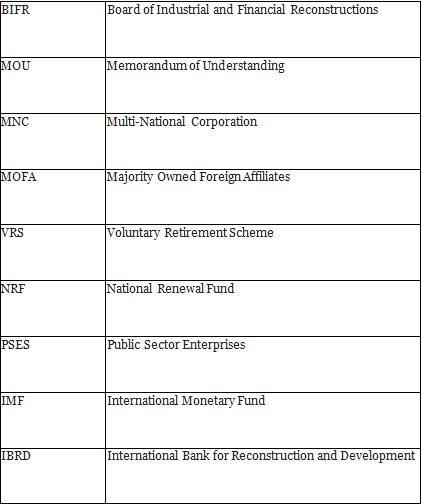
Q13: What are the objectives of privatizing public sector enterprises?
Ans: The primary objectives of privatizing public sector enterprises are following:
- Releasing the large amount, to utilize on other social priority areas.
- Reducing the huge amount of public debt and interest burden.
- Transferring the commercial risk to the private sector.
- Freeing these enterprises from government control.
Q14: State some danger of MNC towards the domestic economy?
Ans: Dangers from MNC:
- Creation of Monopoly: MNC joins hands with big business houses and gives rise to monopoly and concentration of economic power in host countries.
- Threat to National Sovereignty: These corporations tend to interfere in the political affairs of host nations. Some MNCs like IT1 are accused of overthrowing governments in countries such as Chile.
- Alien Culture: MNCs tend to vitiate the cultural heritage of local people and propagate their own culture to sell their products. For example, MNCs have encouraged the consumption of synthetic food, soft drinks, etc. in India.
- Depletion of Natural Resources: MNCs cause rapid depletion of some of the non-renewable natural resources in host countries.
|
39 videos|272 docs|28 tests
|
FAQs on Short Answer Questions: Private, Public and Global Enterprises - Business Studies (BST) Class 11 - Commerce
| 1. What is the difference between a private enterprise and a public enterprise? |  |
| 2. What are the advantages of private enterprises? |  |
| 3. What are the advantages of public enterprises? |  |
| 4. What are some examples of global enterprises? |  |
| 5. How does globalization impact enterprises? |  |





















